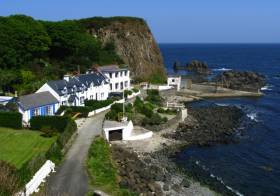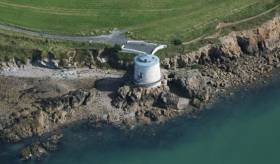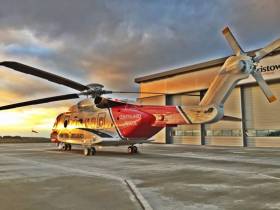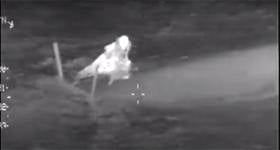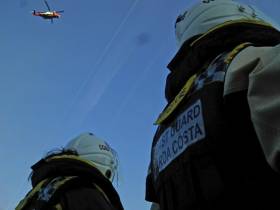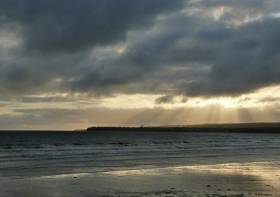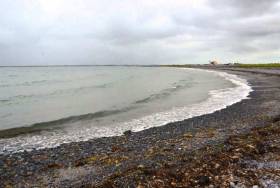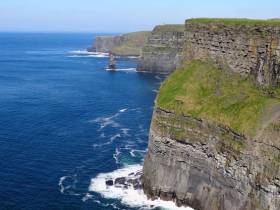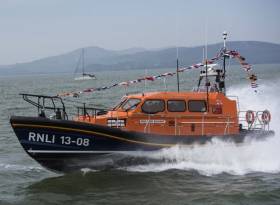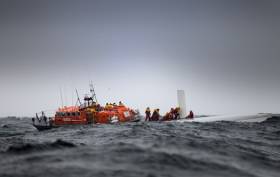Displaying items by tag: Rescue
Father & Son Anglers Rescued From High Tide In North Antrim
#Rescue - Coastguard teams from Ballycastle and Coleraine were joined by Portrush RNLI in the rescue of a father and son who were cut off by the tide while fishing on the North Antrim coast at the weekend.
As the Belfast Telegraph reports, the two found themselves surrounded by the incoming tide while fishing on rocks at Portbraddon on Saturday evening (20 August).
"The tide can rise six or seven feet at Portbraddon, so if you don't know the area it is possible to get caught out quickly without realising it," said Belfast Coastguard officer Dawn Petrie, who added that rescuers used a specialised kayak to retrieve the father and son from the rocks.
The happy ending in this incident came amid a weekend of tragedy around the UK coast, as three men, two women and a child died in separate incidents in severe weather conditions. The Belfast Telegraph has more on the story HERE.
#Rescue - Twelve kayakers rescued amid difficult weather conditions in Dublin Bay yesterday had only limited safety equipment and had not logged their trip with the coastguard, as The Irish Times reports.
The kayaking group were recovered by the Howth Coast Guard and lifeguards from nearby Dollymount after high winds and an outgoing tide started pushing them out into the bay off Red Rock in Sutton yesterday evening (Sunday 7 August).
It since emerged that the 12 paddlers had failed to observe the small craft warning issued ahead of yesterday's forecast high winds, on top of setting out without a marine VHF radio and failing to log their journey with the National Maritime Operations Centre.
Elsewhere, four people were rescued after a fire broke out on their cruiser on the River Shannon near Banagher in Co Offaly at the weekend.
According to The Irish Times, the four on board the White Lady raised the alarm on Saturday evening (6 August) after the fire started in the boat's engine system.
The skipper was able to motor the boat to Banagher Harbour where waiting fire service units brought the blaze under control.
Five Rescued From Sinking Boat Off Scottish Coast
#Coastguard - Five people were rescued as their boat sank under them between Ailsa Craig and Girvan in the Firth of Clyde last night (Saturday 6 August).
Belfast Coastguard received 999 calls just after 6.40pm from the men on the small boat, reporting they were sinking but only an approximate location on the coast.
The coastguard rescue helicopter from Prestwick and Girvan Coastguard Rescue Team were sent to search, while Girvan and Campbeltown RNLI lifeboats were requested.
Coastguard co-ordinators at Belfast also received help from the Irish Coast Guard, who tracked a precise location for the position of the casualty’s mobile phone.
The coastguard helicopter arrived on scene and prioritised winching two people from the vessel who weren’t wearing life jackets.
At this point the vessel sank in rough water, and the three others were rescued from the water and winched into the helicopter.
The five men were landed nearby and met by Girvan Coastguard Rescue Team, who found them to be safe and uninjured.
For many Afloat.ie readers, he was just a silhouetted figure sitting atop a boat waiting to be rescued when Afloat.ie published the story about a solo sailor's rescue off the Wexford coast. Like so many rescue video clips, there was little detail on what had caused the boat to capsize but French skipper Jean Conchaudron's subsequent thank you comment on Afloat.ie to the Irish rescue services shed a lot more light on his remarkable rescue from the Irish Sea.
Conchaudron was voyaging from Newlin, Cornwall to Dublin. His goal was to meet a friend who was coming to Dublin from Iceland. After a few days holidaying in Dublin they would come back with the two boats to Brittany (Perros Guirec).
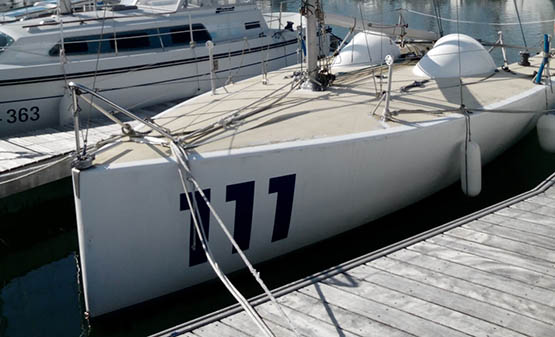 Jean Conchaudron's Mini 6.50 in happier times
Jean Conchaudron's Mini 6.50 in happier times
But as we now know, none of this ever happened. As a result of 'mechanical failure' Conchaudron's keel fell off and he was capsized in seconds.
'Conditions were quite good, I was on deck, wind was about 15 knots, some swell. The boat capsized in about five seconds'.
'I had my PLB in my trousers, and my life jacket on. I triggered the PLB I have in my pocket. It then took to me about half an hour to be able to make a web of ropes to climb on to the hull, I was pushed up and down by the waves, and it took me a while to secure myself with the rope (the web of rope can be seen on the video). It was not possible to start my boat beacon because it was in the cabin and not accessible.
'I then waited to be rescued. The Rescue 117 Helicopter from Waterford saved me and I spent four days in Waterford Regional Hospital due to hypothermia. Thanks to the Irish recsue services, these guys are heroes'.
Conchaudron says he loves Mini 6.50 type sailing and prefers sailing alone. Despite what happened off Wexford, he believes his boat is 'very safe' and well equipped, as are all the boats of this class with a radio beacon and other safety measures. He participated in the "Mini Transat" in 1987, and other races in France.
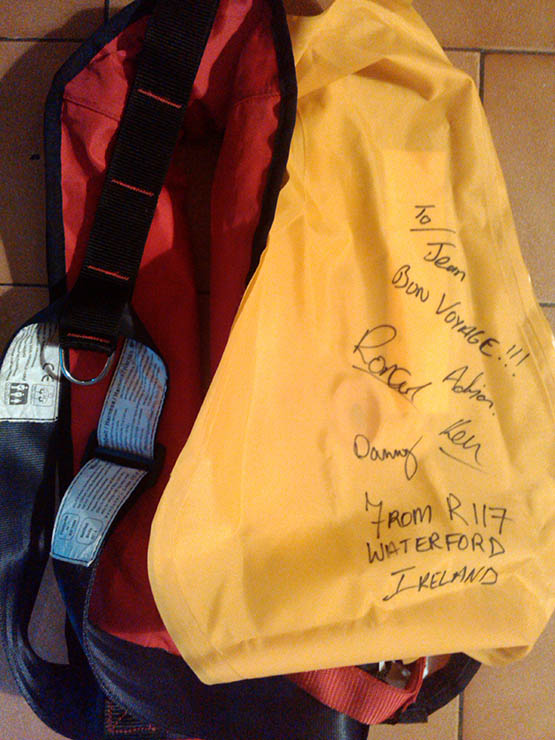 Jean Conchaudron's all important lifejacket signed by his rescuers
Jean Conchaudron's all important lifejacket signed by his rescuers
As far as he knows, the boat is still adrift in the Irish Sea. Conchaudron says the Coastguard is 'keeping an eye on it.' It is his intention to try to get it back, depending on what his insurers say.
'I hope this experience will help other sailors', he wrote on the Rescue 117 Facebook page.
Conchaudron says he has learned an important lesson from the experience and wants to pass it on to other sailors in the hope that it can save other lives at sea: 'Have a PLB in your trousers's pocket, wear your life–jacket, stay afloat, don't sleep and be a warrior to survive'.
#Coastguard - The Irish Coast Guard welcomed the successful rescue last night (Tuesday 26 July) of a lone yachtsman found on his overturned yacht 20 miles off the Co Wexford coast.
The yachtsman triggered his personal locator beacon (PLB) around 8pm last night, which alerted his position to the Marine Rescue Coordination Centre (MRCC) in Dublin.
Waterford's coastguard helicopter Rescue 117 was immediately tasked to the location.
The lone yachtsman was spotted sitting on the hull of his upturned vessel and was subsequently winched to safety and transferred to Waterford Regional Hospital.
A coastguard spokesperson highlighted the importance of observing two important safety rules when going to sea: stay afloat if you do fall in the water, and have a means to communicate or raise the alarm.
Woman Rescued After Kayak Capsize In Liscannor Bay
#Rescue - BreakingNews.ie reports on the rescue of a woman whose kayak capsized in Liscannor Bay this morning (Sunday 24 July).
The woman – one of a group of four – was unable to get back into her kayak, prompting her fellow paddlers to raise the alarm.
Emergency services were notified but the woman was shortly after rescued by the crew of a nearby fishing vessel and given the all clear back at Liscannor Harbour.
The incident came just says after a father and son were rescued from Galway Bay further north after their kayak capsized, as previously reported on Afloat.ie.
Lifeguards Rescue Father & Son Kayakers In Co Galway
#Rescue - A father and son were rescued on Thursday (21 July) by Kinvara beach lifeguards after being washed overboard from their kayak.
Lifeguards Mark Buckley and Niall Hanley contacted the Irish Coast Guard shortly after 3pm when they became concerned about two kayakers who had set out earlier from Traught beach.
Valentia Coast Guard immediately launched a search operation, tasking Galway Bay RNLI, the Shannon-based coastguard helicopter Rescue 115 and the Doolin Coast Guard unit.
Less than one hour after the alert was raised, Rescue 115 located the casualties. They were then recovered by Galway Bay lifeboat, who confirmed that casualties were safe and well.
The coastguard watch officers on duty in Valentia were highly complementary of the two local lifeguards, highlighting their vigilance, timeliness of their report and for piecing together information on the casualties.
Galway Bay RNLI were also complimented for the successful rescue.
Cliffs Of Moher Tourists Injured In Separate Falls
#CliffsofMoher - BreakingNews.ie reports that two tourists are recovering after separate falling incidents at the Cliffs of Moher yesterday (Thursday 21 July).
An Italian woman suffered a serious leg injury on the coastal cliff trail around 10am, while an Australian woman was later injured in a fall elsewhere at the popular Co Clare beauty spot.
Both were assisted by Irish Coast Guard and anbulance crews before being transferred to University Hospital Limerick for treatment. BreakingNews.ie has more HERE.
Major Marine Rescue Demo On Lough Foyle This Weekend
#Rescue - Moville on the shores of Lough Foyle is set to host a major marine rescue demonstration this coming weekend, as Inishowen News reports.
Naval Service vessel LÉ Orla will join Air Corps aircraft, the Irish Coast Guard, Lough Swilly RNLI, Foyle Rescue and more for the Irish Marine Search and Rescue Demo (IMSARC) on Saturday 16 July.
Events commence at 1.30pm on the day with water-based demonstrations by the coastguard helicopter, drone aircraft and others, while on land, mountain rescue teams will go through the basics of dangerous cliff-face operations.
The weekend continues with the Clipper Family Fun Day in nearby Greencastle on Sunday 17 July from 3pm-5pm, part of a week of celebrations for the Foyle Maritime Festival awaiting the arrival of Derry~Londonderry~Doire and the rest of the Clipper Race fleet.
Inishowen News has a full rundown of the IMSARC itinerary HERE.
Yesterday, US businessman and life long-sailor and entrant in tomorrow's Round Ireland Race, George David, met one of the men who saved his life off the Cork coast five years ago.
George’s 100 foot yacht, Rambler 100, capsized during the 2011 Fastnet Race. See photos of Rambler100's capsize here
George and seven other of the 21 crew members were hurtled overboard, where they remained stranded in freezing waters for over three hours.
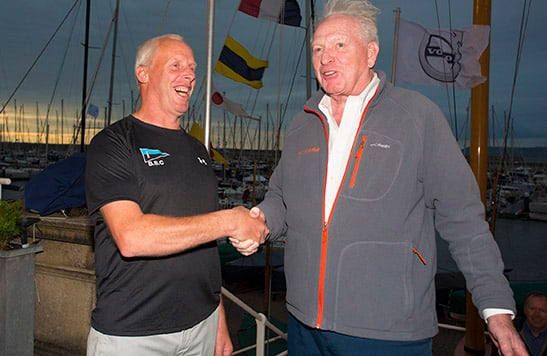
US businessman and life long-sailor, George David, pictured right with Pat Collins, one of the Baltimore lifeboat crew, who saved his life after his yacht capsized during the 2011 Fastnet Race.
Following a dramatic air and sea rescue by the Baltimore RNLI and the Irish Coastguard, George vowed that he would one day return to Ireland to compete in the 704-mile Volvo Round Ireland Yacht Race as a tribute to the people of Ireland.
He has come good on his promise and has arrived ahead of Saturday’s race start from Wicklow Bay with his latest racing boat, Rambler 88.
George joined the hundreds of crew from the record 64-strong Volvo Round Ireland fleet for a special welcome reception in Dún Laoghaire’s Royal Irish Yacht Club on Thursday evening.
He received a hero’s welcome, but remained philosophical about his experience:
“When you’re in trouble it is what it is. We had 21 people sailing and 21 people survived. We think about these things intellectually. It was very important that the entire team was amazingly calm in the face of adversity.”
Pat Collins was one of the Baltimore lifeboat team who rescued George and his crew. He recalled the difficulty in locating Rambler amid the foggy conditions on the evening: “Everything happened so fast. We were getting no response from Rambler. Five of the crew had drifted away and had spent hours in the water. The outcome could have been very different.”
George aboard Rambler is a strong contender to break the Volvo Round Ireland Race record of two days, 17 hours, 48 minutes and 47 seconds which was achieved by Mike Slade in ICAP Leopard 3 in 2008.
However George says that after many years in business he has learned to “under-promise and out-perform.”
“I have good expectations but actuals always exceed expectations. I would rather look back at a successful race than to promise something that might or might not happen. But I think we’re ready”
Race organiser Theo Phelan said George’s decision to return to Ireland for the 2016 Volvo Round Ireland is a huge honour for the race and for the people of Ireland.
“The efforts of the Irish rescue services in locating and bringing to safety George and his crew after three hours in the water, is a matter which raised his interest in finding a suitable offshore event for a return to the country for which he has enormous regard and appreciation.”



























